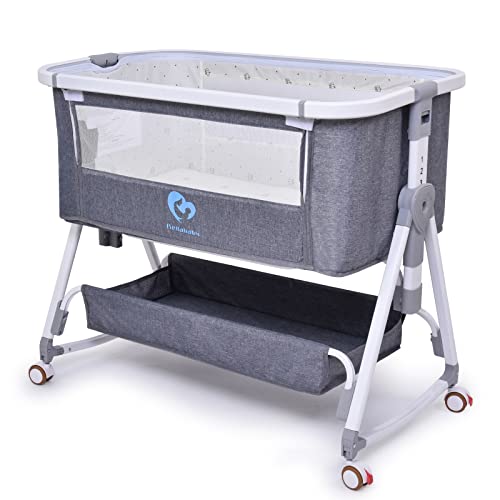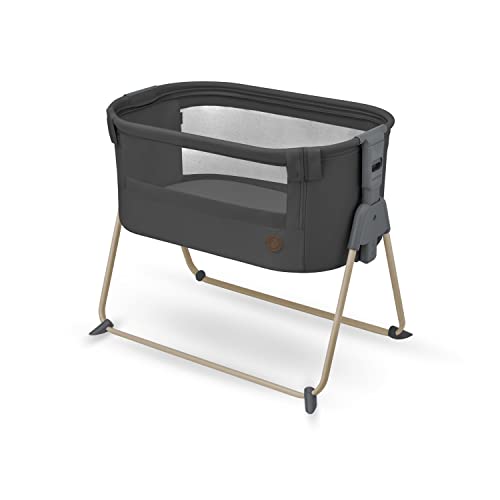5 Killer Quora Answers To Bedside Crib
페이지 정보

본문
 Buying a Bedside Crib For Travel
Buying a Bedside Crib For TravelThe crib's size is a hit with moms - it's bigger than the Moses basket, but smaller than a cot bed. It's also foldable down to one-quarter of its original size and fit into a handy bag for transport.
 Keep in mind that the crib is designed for sleeping. Toys or blankets, pillows and pillows can make a child suffocate.
Keep in mind that the crib is designed for sleeping. Toys or blankets, pillows and pillows can make a child suffocate.Safety
When you're looking for a travel cot, ensure that the manufacturer complies with all safety standards. A good starting point is the Consumer Product Safety Commission (CPSC) website, which will inform you whether or not a certain portable crib has been removed from the market. You should also select a mattress that is appropriate for your baby's crib so that it doesn't fall into the gaps between the sides of the crib or create a suffocation risk.
When you are choosing the right bassinet or crib make sure it is in compliance with the latest safety standards that were updated in 2022. Avoid cribs that are older or that have been modified for travel cot bedside crib, or cribs with drop-sides. These cribs haven't been tested, and could be a danger to your baby's safety.
A travel crib must be well-constructed and sturdy. Check for missing, loose or broken screws and other hardware. If you're using a playard, it should have secure walls and mesh windows to ensure adequate air circulation. The crib slats should not be more than 2 3/8 inches apart to prevent the baby bedside crib's head and legs from getting trapped. Don't put any blankets, pillows, stuffed animals or toys in the crib. These objects can choke or strangle your baby. They should be removed from the crib at the time your child is able to pull up on their hands and knees or prior to 5 months old or when they reach 5 months of age, whichever comes first.
It's also important to check regularly for broken or loose hardware and screws, especially when you travel with your infant. Take all plastic out of the crib too.
If you're using a portable crib, make sure that it's not right under windows. A window is an accident hazard for your baby could get hurt when they fall into it. It is recommended to keep your baby's sleeping space away from windows, even when they are old enough to roll over. If your baby starts to roll over while sleeping, it's a good idea to get them up in order to avoid injury.
Portability
Whether you're going on vacation, have family staying over, or just need a secure bedside crib for sleepovers or with friends, an portable crib (or playard, as they are sometimes called) is a good option. These playards fold up and have a comfortable mattress that can support babies up to 15kg. They are simple to put together and compact when closed.
The BabyBjorn Travel Crib is a favourite with MFM home testers, who love the fact that it can be folded down and stored in just a few minutes and that its easy-to-use drop-down panels are simple for even sleepy parents to use. It's not our lightest pack-and play, but at under 15 pounds it's still an acceptable weight. It also comes with normal handles instead of a backpack style strap, which some prefer.
Another option that is worth considering is the Joie Kubbie Sleep, which combines a cheap bedside cot crib and bassinet into one compact unit that's ideal for both holidays and overnight visits to family and friends. It's not the cheapest alternative but it does come with many options, including a storage basket, soothing night lights that change color and lullabies, as well as white noise, to aid your child to fall asleep.
The fabrics are machine washable and washable, which makes it easy to clean. It's also quite light at less than 12kg and easily fits inside the compact, convenient travel case that comes with it. It comes with six different height settings, as well as an adjustable tummy tilt for reflux or colic babies. It's suitable for all sizes of beds. It's also incredibly quick to install and has our MFM tester able to get it up and running in a mere 10 minutes. It'll require a separate mattress.
Feeding
When you travel for pleasure or business it's crucial to ensure your baby is comfortable and safe on the road. It's better to purchase a crib or bassinet designed for travel than to use one that you already own. They are smaller and have mesh sides, which allows parents to check on their baby without causing any disturbance to them. They are also lightweight and can be easily transported between places. They also meet all the safety standards of the American Academy of Pediatrics (AAP) and have not been recalled.
If you have to use a bedside crib, it's recommended that your child be laid on their backs and that the sleeping surface be free of pillows, blankets, and toys. Sharing the bed with parents isn't advisable for any baby regardless of age, and this form of sleeping with a partner is associated with an increased risk of SIDS. If you have to occasionally co-sleep ensure that your baby is sleeping and that you and your partner are fully dressed and awake.
The kinds of cribs that are available for infants and young children include:
Some are designed like an oversized crib or Moses basket, and others have sides that can be lowered to the bed of the parent. This allows parents to reach their child in the middle of the night to soothe and feed their child, and avoid the dangers of sleeping with their child. The AAP cautions against this due to the danger of suffocation. Examples include the Arm's Reach Clear-Vue Bassinet, a bedside sleeper that attaches to the side of a parent's mattress. It can also be an option for older children because the sides can easily be raised to let you reach the infant from the adult bed without lifting the mattress out. Another option is a travel cot, which has a built-in bassinet which can be removed from the top of the crib making it easier to raise an infant who is sleeping for feeding or other care.
Sleeping
Bedside cribs are an excellent method to sleep in a safe environment with your infant. They are placed next to your bed so you can easily reach them during night feedings and check on their sleeping without disrupting them. Some cribs have a drop side that can be lowered to make this easier and some have an adjustable height adjustment to ensure they are able to fit your bed at home or on the go.
Although it was previously advised that babies sleep in their own separate bedroom, there is now a increasing preference for parents to sleep with their infants. Also known as rooming-in, this arrangement allows babies to be close to their parents yet remain safely separated on their own bassinet or crib. There are several types of co-sleepers that are available, including the iCrib which is designed to be a portable crib that fits on top of your bed or a regular crib. It has a light frame and a mattress that is removable and it can be folded for easy storage. There is also the Joie Roomie Go crib, which fastens to the edge of a bed. It includes 7 adjustable height positions and a tummy tilt for reflux and colic. Our MFM home testers highly praised the crib for its compact folding and easy to use. It is also available in different colours.
There are also freestanding bedside cribs, like our Lilly and Alain cribs, that can be positioned alongside the traditional bed frame. The cribs come with an elongated side that can be lowered to allow you to pick up your baby for feedings at night. However they are also self-contained, allowing your baby to rest comfortably. These cribs also meet the new BS EN 1130:2019 safety requirements that specify that a 120mm high barrier must be present between your mattress and your child's cot.
There are also travel cribs that are specifically designed to be taken on the road. They tend to be smaller and more compact than standard cribs, making it easier to move them from and into hotels and vehicles. The Munchkin Brica travel crib, for example can be set up and packed down in less than one minute, and weighs just 3 pounds, making it easy to move and carry.
- 이전글Do Not Make This Blunder With Your What Causes Mesothelioma Other Than Asbestos 24.12.19
- 다음글What's Everyone Talking About ADHD Private Diagnosis Cost Today 24.12.19
댓글목록
등록된 댓글이 없습니다.